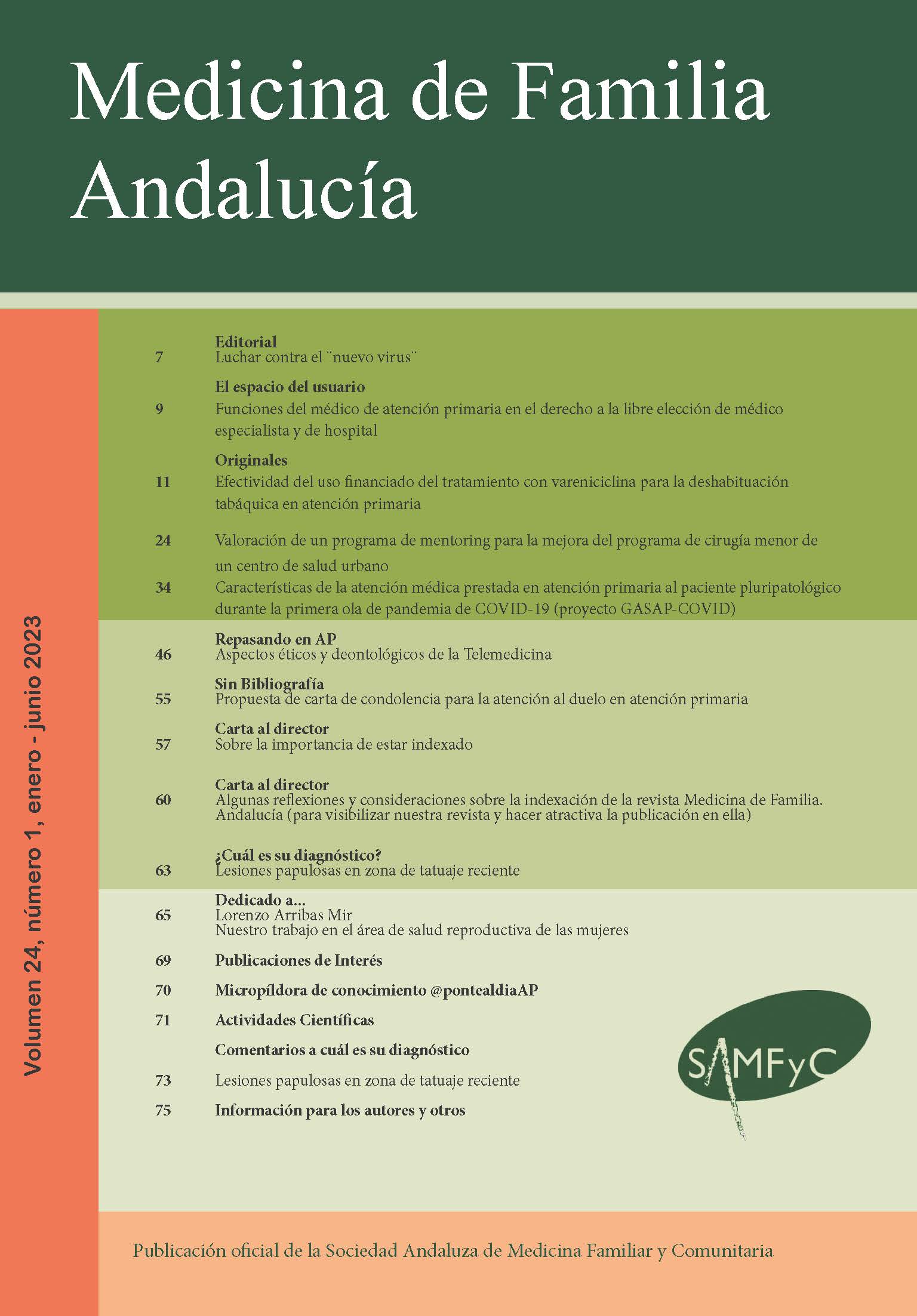Efectividad del uso financiado del tratamiento con vareniclina para la deshabituación tabáquica en atención primaria
Muñoz Galiano JC1, Larrubia García M1, Pérez Milena A2
1Médico de Familia. Centro de Salud Belén. Jaén. Servicio Andaluz de Salud
2Doctor en medicina. Médico de Familia. Centro de Salud El Valle. Jaén. Servicio Andaluz de Salud
Título: efectividad del tratamiento financiado con vareniciclina para la deshabituación tabáquica en atención primaria.
Objetivo: se pretende conocer la efectividad del uso financiado de la Vareniciclina en Centros de Salud públicos.
Diseño: estudio descriptivo mediante.
Emplazamiento: 8 Centros de Salud urbanos.
Población y muestra: pacientes fumadores incluidos en el programa de intervención avanzada individual contra el tabaquismo durante el año 2020 y que han tomado Vareniciclina para conseguir la abstinencia.
Intervenciones: encuesta telefónica y auditoria de historias clínicas.
Resultados: participaron 96 pacientes, tratados durante 7,0±3,3 semanas con 2,7±1,3 consultas de seguimiento. 82,3% dejaron de fumar, pero solo 46,2% consiguieron una abstinencia mantenida superior a un año, relacionada con menor dependencia a la nicotina medida con el test de Fagerström (OR 0,39) y posiblemente un mayor consumo de cigarrillos (OR 1,02). Los fumadores que recaen tienen menor dependencia a la nicotina que antes de tomar Vareniciclina (Fagerstrom 5,3±2,0 vs 8,1±0,8; p<0,05 test t Student) y presentan motivaciones diferenciadas por sexo.
Conclusiones: se podría incrementar la efectividad de la Vareniciclina con un seguimiento proactivo por el médico de familia, disminuyendo la dependencia y provocando disonancias cognitivas de las motivaciones para el tabaquismo.
Palabras clave: Atención Primaria, Cese del Hábito de Fumar, Vareniciclina.
Title: Effectiveness of the funded use of treatment with vareniccline for smoking cessation in primary care
Objective: Smoking is a global health problem. The present investigation is intended to know the effectiveness of the financed use of Varenicicline in andalusian public Centers of Primary Care.
Design: A descriptive study is designed.
Setting: 8 Primary Care Centers.
Population and sample: Smokers included in the individual advanced intervention program against smoking during the year 2020 and who have taken varecycline to achieve smoking cessation.
Interventions: a telephone survey and an audit of medical records.
Results: 96 patients participated, treated 7.0±3.3 weeks with 2.7±1.3 follow-up visits. 82.3% quit smoking but only 46.2% achieved sustained abstinence for more than one year, related to less dependence on nicotine, measured with the Fagerström test (OR 0.39), and possibly higher number of cigarette consumption (OR 1.02). Smokers who relapsed are less dependent on nicotine regarding the start of the study (Fagerström 5.3±2.0 vs 8.1±0.8; p<0.05 Student’s t test) and presented motivations differentiated by sex.
Conclusions: The effectiveness of Varenicicline could be increased with a proactive follow-up by the general practitioners, reducing dependency and causing cognitive dissonances of motivations for smoking.
Key words: Primary Health Care, Smoking Cessation, Vareniciline.
